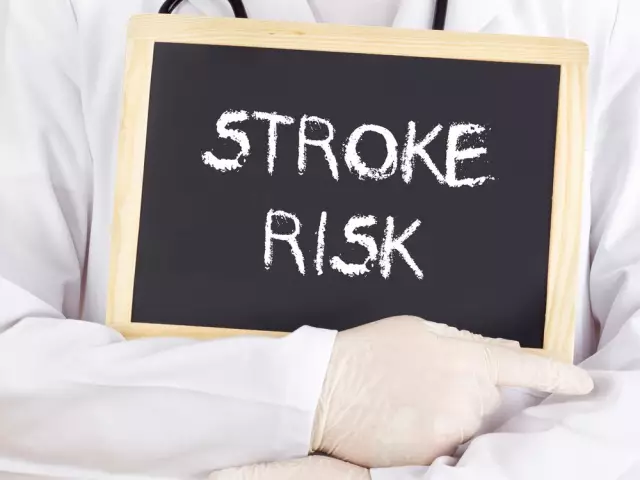- Author Rachel Wainwright wainwright@abchealthonline.com.
- Public 2023-12-15 07:39.
- Last modified 2025-11-02 20:14.
7 tips for preventing stroke
Stroke (acute violation of cerebral circulation) is one of the most common neurological diseases. More than 6 million people die from this disease in the world every year. About 80% of people who have suffered a stroke become disabled, almost a third of them subsequently require constant care. With a stroke, some of the brain cells are deprived of access to blood, losing the ability to receive oxygen and nutrients, and die. As a result, disorders of speech, vision, motor functions, memory and thinking develop. In the absence of urgent medical attention, the likelihood of death is very high.
Risk factors for the development of stroke are hypertension, diabetes mellitus, atherosclerosis, heart disease, blood disorders (high viscosity), bad habits (overeating, smoking, drinking alcohol), old age. All tips for the prevention of stroke are related to minimizing the impact of each of these factors on health.
Blood pressure control
People with arterial hypertension are especially frequent victims of strokes. They have cerebral hemorrhages (hemorrhagic strokes). Moreover, there are two possible scenarios for the development of events: either one of the cerebral vessels bursts, or blood seeps through its wall into the surrounding tissues for some time. In any case, high blood pressure (or pressure surges) plays a major role in this process. And for hypertensive patients it is very important to keep the situation under control and regularly take medications prescribed by the doctor to help maintain blood pressure at an optimal level.
At the initial stage, hypertension often develops asymptomatically or manifests itself in the form of symptoms (headache, dizziness, drowsiness), which are similar to that of ordinary fatigue. Ignoring the primary symptoms of the disease can lead to hemorrhagic stroke at a young age.

Source: depositphotos.com
Lower cholesterol levels
Most strokes occur when the arteries in the brain become narrowed or completely blocked (ischemic stroke). The cause is cholesterol plaque deposited on the walls of blood vessels. To minimize the likelihood of illness, you must adhere to a diet that involves limiting fat intake. It should be borne in mind that not all fats are harmful to the body (for example, polyunsaturated omega-3 and omega-6 fatty acids are very useful).
People over 50 are advised to periodically donate blood for a cholesterol test.

Source: depositphotos.com
Regular heart checks
Any violation of cardiac activity (rhythm failure, tachycardia, ischemia, etc.) creates an increased load on the walls of the vessels of the brain and increases the likelihood of stroke. An important factor in prevention is heart control. Regular ECGs, adherence to bed rest for influenza and ARVI, systematic physical activity significantly reduce the risk of stroke.

Source: depositphotos.com
Maintaining normal body weight
For people prone to gaining excess weight, the risk of metabolic disorders is very high. Obesity often results in diabetes mellitus, vascular sclerotization, and changes in the rheological properties of blood. If a person who is significantly overweight does not try to reduce it, problems with cerebral circulation are very likely.

Source: depositphotos.com
Prevention of diabetes
According to statistics, the presence of diabetes increases the risk of stroke by 2.5 times. This is not surprising: diabetics often experience heart failure, excess weight and poor vascular walls. In addition, when carbohydrate metabolism is disturbed, the rate of excretion of water from the body increases, which increases the density of the blood.
In order to avoid the development of a stroke, it is necessary to monitor the diet, limit the intake of fast carbohydrates and control the level of glucose in the blood, periodically passing the appropriate tests.

Source: depositphotos.com
Stress management
At the moment of nervous tension, a large amount of adrenaline is released into the bloodstream. The glucose level rises sharply, the heart begins to work more actively, and blood pressure rises. There is a momentary load on the vessels, which can lead to a stroke.
Of course, it is impossible to completely eliminate stress from life, but it is worth learning how to control your reaction to stressful situations. People who are prone to nervousness may need to consult a doctor - he will recommend sedatives.

Source: depositphotos.com
Organization of work and rest regime
With the onset of the gardening season, the number of strokes increases. The reason is that summer residents, yearning for their plots, begin to vigorously plant and weed, forgetting that their body, weaned from physical activity during the winter, may not withstand such a radical change.

Source: depositphotos.com
In order to prevent stroke, you should lead a healthy lifestyle. Smoking and alcohol abuse, lack of physical activity, work without days off and holidays are no less dangerous than problems with blood pressure or metabolism.
A stroke is quite capable of killing a person or significantly reducing the quality of life, not only of the patient himself, but of his entire family. You must remember this and behave responsibly, referring to doctors in case of illness.
YouTube video related to the article:

Maria Kulkes Medical journalist About the author
Education: First Moscow State Medical University named after I. M. Sechenov, specialty "General Medicine".
Found a mistake in the text? Select it and press Ctrl + Enter.






